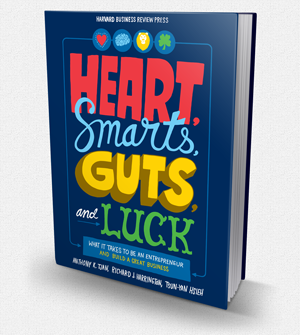 Author: Anthony K. Tjan, Richard J. Harrington, and Tsun-Yan Hsieh
Author: Anthony K. Tjan, Richard J. Harrington, and Tsun-Yan Hsieh
Publisher: Harvard Business Review Press
Book Review by: Sonu Chandiram
After speaking with hundreds of business builders around the world the three authors of this great book found four main attributes as their keys to success.
The key traits they found in the people they interviewed were heart, smarts, guts and luck. They cite four examples of well-known successful people who each had these traits that were dominant in them:
- Starbucks CEO Howard Schultz as heart-dominant
- Berkshire Hathaway CEO Warren Buffett and Amazon CEO Jeff Bezos as smarts-dominant
- South Africa’s freedom fighter leader Nelson Mandela and Virgin Atlantic’s founder Richard Branson as guts-dominant
- Zappos CEO Tony Hsieh as luck-dominant
The authors spell out these four key distinctions and paint the profiles of famous entrepreneurs in the first chapter in this book, expand on each one in the next four chapters, and discuss other essential lessons to learn in the last five of 10 chapters, in order for you to be equipped with the tools needed to build a successful business.
The authors wrote this book to help you acquire two basic, highly important values, as they spell out in their Introduction, Our Purpose and Guide to this Book:
- An increased self-awareness relating to starting and successfully running your new business, and the decisions you need to make.
- Practical wisdom, case studies and habits that will help you do the business-building right or better than you otherwise would, without this help.
I urge you to take the test I write about in the paragraph below as an initial step to self-discovery. Are you cut out to make money in business? Or are you more likely to lose the investment? By no means is this test the final answer to the question of whether you can succeed in business, but it is definitely a good start.
The authors elaborate on the four important traits in a separate chapter for each one. They offer you some unconventional advice. For example in the chapter, Heart: Winning the Heart, they question whether a having a business plan is necessary. They reveal that 70 percent of the hundreds of business people they spoke with at length, said that they did not start their business with a plan.
In the chapter Smarts: IQ Is Only the Beginning, the authors write that there are several kinds of smarts. Having a little bit each of book smarts, street smarts, people smarts and creative smarts equips you with the “acumen, sensibility, and responsiveness” or what is called business smarts, a combination of the other four types of smarts. Business smarts enables you to emphasize one or the other type of smarts when dealing with different types of people. For example, you would deemphasize book smarts when dealing with a primarily street smarts person.
People in business for themselves know that entrepreneurship often forces you to make the ultimate or final decision yourself, after getting input from others. It is a lonely endeavor and you bear the blame if your decision ends up in loss of a large amount of money, your reputation or valuable employees. It really hurts. That is why starting a business requires guts. And lots of it.
Why? For example, once you’ve started your business, your expense meter is always running, but there is no guarantee the revenues meter will run in the beginning, or will keep on running and be ahead of the expense meter. That is why smart business people take well-calculated risks, or keep their expenses at a minimum until revenues grow to a substantial level and pace.
It is no wonder that in the chapter Guts: How to Initiate, Endure and Evolve the authors point out: “the Guts-Heart combination is among the most common for those who start businesses.”
Why is luck important for business success? The other three characteristics – heart, smarts, and guts – in successful business people may also be abundantly evident in you, but if you’re not lucky (sometimes described as ‘being in the right place at the right time’) success will elude you.
The authors write in the chapter Luck’s Inevitable Role in Business-Building:
“There are no guarantees to entrepreneurial success. Your concept may be bold. Your Heart quotient high, your Smarts and Guts peaking, but external factors beyond our control are always at play.”
“The business environment is fickle, and business-builders can’t every fully where their concepts, or plans, will take them. Last-minute glitches or UKVs – unforeseen killer variables – are always lurking and threatening havoc, especially in early-stage businesses.”
One of the most useful features of this interesting book is the Entrepreneurial Aptitude Test that you get to “EAT” in the last chapter. It reveals what is your most dominant trait among the four: Heart, Smarts, Guts and Luck (HSGL). The total possible score is 19.
I took this test and my HSGL scores were: 7,5,4,3 for a total of 19. So I’ve got a lot of Heart, enough Smarts, some Guts, and my Luck score the least of the four. Why not find out what is your entrepreneurial aptitude by taking this revealing test? Get this book: its true value is not only worth its weight in pure gold, but much, much more.






